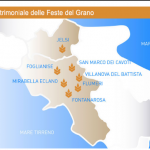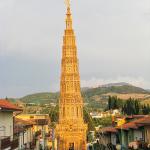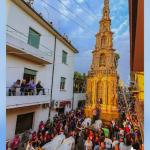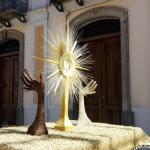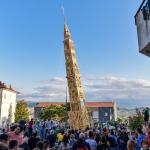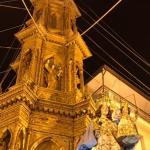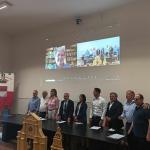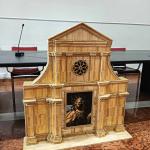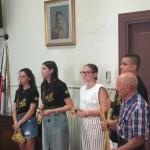The Italian municipalities of Flumeri, Fontanarosa, Foglianise, Jelsi, Mirabella Eclano, San Marco dei Cavoti and Villanova del Battista, located along the Southern Apennines, between Campania and Molise, in the provinces of Avellino, Benevento and Campobasso, have recognized themselves as a new heritage community, a single “network community”, in the name of the common ritual traditions linked to wheat and their patron saints.
In each of these towns the wheat cycle is celebrated through spectacular festive machines, traglie, carts and obelisks up to thirty meters high, made by skilled local craftsmen with hand-woven grains and ears of wheat.
In the months of July, August and September, the artistic machines are carried in procession by the entire community, pulled by tractors or oxen, in a triumph of choral joy.
On August 6, 2024, at the Sala Grasso of the Province of Avellino, the press conference was held to present the 2024 Wheat Rites and Festivals, coordinated by Giuseppe Silvestri, Provincial President of Unpli Avellino and vice president of the Fondazione Sistema Irpinia.
"Believing united to renew the emotions, the stories of wheat and carts. It is to be considered an intangible asset, a UNESCO heritage, because it links religion, folklore, history, culture, it is a union of communities. The symbol of the G7 of Mirabella Eclano, which will be held in early October, is precisely the Mirabella cart which however could represent all the Carts... It would be nice to win the challenge of creating a single symbol that makes us recognizable and visible to the world. To achieve the UNESCO goal, we must not only network between our Municipalities, a challenge already won by breaking down parochialism a few years ago, but seek a European country with which to create a twinning, which has the same tradition of wheat and weaving as us" says Raffaella Rita D'Ambrosio, Councilor for Culture of Mirabella Eclano.
Also present was Helga Sanità, a professor at the Suor Orsola Benincasa University, who added: "It is very important to think about twinning with a European reality, because this tradition, which has finally overcome local parochialism, can also be a way to speak to the rest of the world. The material heritage of humanity means precisely this: that the wheat rites along the Southern Apennines can be an exemplary model of a tradition that resists, that is alive and for which wheat is a sacred symbol, not a mere material resource, but of something that goes beyond, a very important symbol that tells of the community alliance, of the intertwining that keeps these communities united in the name of powerful symbols such as the Irpinia lilies, but also the floats of Sannio and Molise. We therefore hope that the heritage network of wheat festivals becomes an increasingly larger reality, which can also accommodate other festivals along the Apennines, because there are so many of them in Italy, as far as Sicily and even beyond, in Europe, in countries like Poland, Ukraine and many others. We are trying to create a twinning with Poland, with a country that we have identified, but we have not yet actually established the alliance, because we are trying to understand which are the heritages where the traditions are more authentic and closer to ours, so that it can act as a leader to have UNESCO grant the network candidacy and therefore the patronage"
"We have been setting up the network of lilies and floats for years - said the mayor of Flumeri Angelo Lanza - to ensure that the procedure for UNESCO recognition is completed, even if we know that the process is very long and there is a lot of work to do. We are confident that our heritage will be recognized and known. On August 8th, the lily will be raised, built in a horizontal position and then hoisted by hand to then complete the covering, on August 15th it will be moved to the church of the patron saint, San Rocco"
The mayor of Villanova, Ernesto Iorizzo, declared: "The UNESCO recognition would be an excellent springboard to highlight the fantastic territories, the extraordinary sunsets and a gastronomic culture from Irpinia".
Giuseppe De Iesu, deputy mayor of Fontanarosa, concluded: “We hope for a good turnout of the public so that they can admire the work of art that represents Fontanarosa. It is a promotion of the float and the straw festival, and of the Ferragosto of Fontanarosa, a project of return tourism. Finally, we have added an exemplary concept of the Nativity scene and we will have a show on the 13th with Nuova Compagnia di Canto Popolare, on the 14th with Eugenio Bennato and on the 16th with Banda Bardò. On the 15th there will be the solemn procession and other meetings, other experiences. In Fontanarosa, on the 9th and 10th of August, we will exalt all the food and wine products of the capital”.
From the birth of the network of the Municipalities of Irpinia, Sannio and Molise, the project entitled "Rituals and artistic grain carts. Research and studies aimed at developing a network candidacy dossier for registration in the Representative List of the Intangible Cultural Heritage of Humanity UNESCO" was born, winner of the Call of the Campania Region (BURC n° 48 of 16 July 2018), it is the happy result of the path begun in 2015 when the municipalities of Fontanarosa, Flumeri, Mirabella Eclano, Villanova del Battista, San Marco dei Cavoti, Foglianise and Jelsi signed a memorandum of understanding and a subsequent Convention (municipality of Fontanarosa n° 427/REG. N° 130/Sector 1° – General Affairs, 20/09/2016), entrusting the Suor Orsola Benincasa University of Naples with a feasibility study for the development of a network candidacy proposal for registration in the Representative List of the Intangible Cultural Heritage of Humanity UNESCO traditional festivals linked to the wheat cycle between Campania and Molise in the UNESCO Intangible Heritage of Humanity List.
The first study, conducted by the Anthropology Laboratory of the Suor Orsola Benincasa University of Marino Niola and Elisabetta Moro, coordinated and directed by the anthropologist Helga Sanità, led, among other results, to the registration of the grain festivals characteristic of Irpinia and Sannio in the IPIC inventory of the Campania Region.
The new regional funding (CUP D66C18000330002) has made it possible to intensify research on these particular rituals by involving the communities involved, complete the cataloging of the festivals for the national inventories, organize study days and an international conference, produce scientific publications and informative materials, create the website www.festedelgrano.net, and finally draft the candidacy dossier to be submitted to UNESCO for consideration.
Network of Rites and Festivals of Grain of Irpinia, Sannio and Molise - Calendar 2024
July 26, 2024: Parade of the Traglie and Grain Carts in Jelsi (Province of Campobasso)
July 28, 2024: Transport of the Carrettone in Fontanarosa (Avellino)
August 3, 2024: Raising of the Dome in Fontanarosa
August 8, 2024 in the afternoon: Raising of the Lily in Flumeri
August 11, 2024: Parade of the Grain Carts in San Marco dei Cavoti
August 14, 2024 in the afternoon: Pulling of the Cart in Fontanarosa (Avellino)
August 15, 2024 in the afternoon: Pulling of the Lily in Flumeri
August 15, 2024 in the afternoon: Pulling of the Sheaves Carts in Frigento
August 16, 2024 in the morning: Procession with the Mezzetti in Frigento (Avellino)
August 16, 2024: Grain Cart Parade in Foglianise (Benevento)
August 18, 2024 in the afternoon: Raising of the Lily of Villanova del Battista (Avellino)
August 27, 2024 at 5:00 p.m.: Pulling of the Lily of Villanova del Battista (Avellino)
August 25, 2024: Transport of the Cart in Mirabella Eclano (Avellino)
September 14, 2024 in the afternoon: Great Pulling of the Cart of Mirabella Eclano
